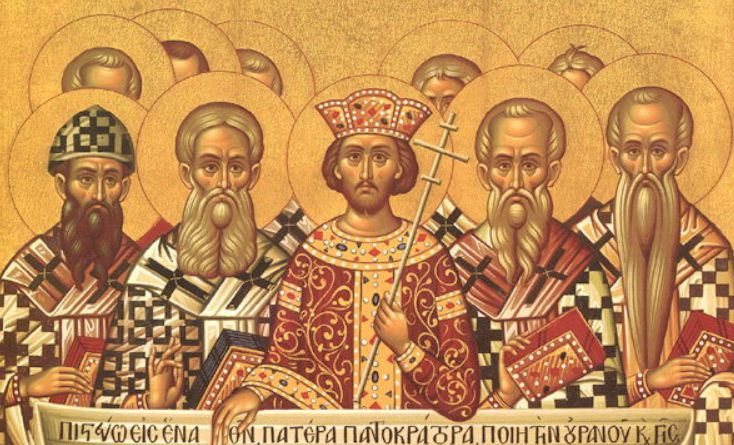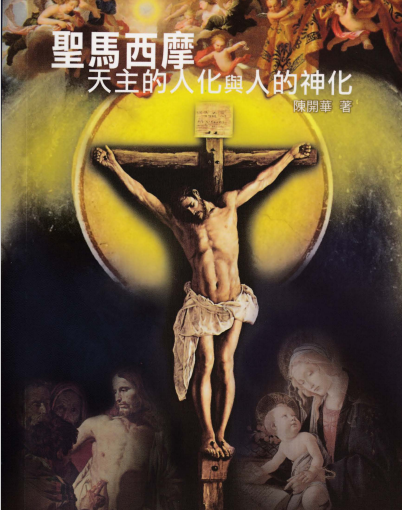675托勒多公会议
信经—论天主圣三
神圣三一
我们承认,我们相信神圣的,无可言喻的圣三,父及子及圣神,是一个天主,本然地(本性地)具有一个性、一个体,也具有一个尊严,一个德能。
We confess and believe that
the holy and ineffable Trinity, Father, Son and Holy Spirit, is one God by
nature, of one substance, of one nature as also of one majesty and power.
圣父
而且,我们信认:父固不受生,不受造,而是不受生者。因为祂不从任何开始,而子却从祂诞生;还有圣神,也是从祂(父)所发的。为此,祂(父)本「身」就是整个天主性体的泉源和原始。
And we
profess that the Father is not begotten, not created, but unbegotten. For He
Himself, from whom the Son has received His birth and the Holy Spirit His
procession, has His origin from no one. He is therefore the source and origin
of the whole Godhead.
父本「身」,也是属于自己的本体;祂从(自己)无言可喻地生了子,但不是从别的,而是从自己生了子:天主生天主,光生光;所以,「上天下地的一切「父性」,都是由祂而得名」(弗:三,十五)
He Himself is the Father of
His own essence, who in an ineffable way has begotten the Son from His
ineffable substance. Yet He did not beget something different (aliud) from what
He Himself is: God has begotten God, light has begotten light. From Him,
therefore, is “all fatherhood in heaven and on earth” (cf. Eph. 3.15
Vulg.).
圣子
我们也承认:子出自父的性体,没有开始,在万世之前受生,而不是受造;因为从来没有父而无子之一日,也没有有子而无父之一日,
We
also confess that the Son was born, but not made, from the substance of the
Father, without beginning, before all ages, for at no time did the Father exist
without the Son, nor the Son without the Father.
但不是像子出自父,同样,父出自子,因为不是父从子,而是子从父接受了诞生。所以,子是出自父的天主,父是天主,而不是出自子;父固是子的父,而不是出自子的天主:但祂是父的子,但是出自父的天主。虽然,子通过万有,与天主父平等,因为子从来没有开始受生的一天,也没有中止受生的一日。
Yet the
Father is not from the Son, as the Son is from the Father, because the Father
was not generated by the Son but the Son by the Father. The Son, therefore, is
God from the Father, and the Father is God, but not from the son. He is indeed
the Father of the Son, not God from the Son; but the latter is the Son of the
Father and God from the Father. Yet in all things the Son is equal to God the
Father, for He has never begun nor ceased to be born.
(我们)也相信:祂(子)父,共有一个性体,因此祂亦可以被称为:与父同一性体者;…因为我们相信:子,也不是从无中受生,也是从别的性体受生,而是从父的性体—(从父的怀中)—受生,
为此,父是永远的,子也是永远的。父既永远存在,祂自亦永远生子而为父。我们也因此而相信:子在无始时,受生于父。
我们也不说:同一天主的子,既为父所生,那就成为天主性体的一部份,而说:完全的父,完全的子;父在无贬损无分割的情况下,生了子,因为只有一个天主性体,故不能产生一位不同等的子。
而且,这位天主之子,是天生的子,而不是过继(螟蛉)之子,但我们该信:天主父生子,既不出自意志,也不自于不得已;因为在天主,既没有不得已的事,也没有走在智慧之前的意志。
圣灵
我们也信圣神;祂是圣三中之第三位,与父及子,共是一个,同等的天主,共有一个本性,也共有一个性体。但祂,既不受生,也不受造,而是由二位(父与子)所共发的、而是父与子的神。
又信:这一位圣神,既不是不受生者,也不是受生者:假设我们说,圣神是不受生者,那么,我们就该说:有两位子了。可是,圣神,也不祇是父的神,也不祇是子的神,而是父与子的神。
因为圣神,既不是发自父而成为子,也不是发自子,而成为受祝圣的受造之物,而是由父与子所共发的,因为,圣神被认为:是(父与子)二位的爱与圣德。
为此,这位圣神,被信为:为(父与子)二位所派遣,一如子为父所派遣一样,但祂并不小于父及子,而子却被证明:因其所取的肉体—(肉性),则小于父及圣神。
The oneness in the
Trinity
This
is the way of speaking about the Holy Trinity as it has been handed down: one
must not call it or believe it to be threefold, but Trinity. Nor can it
properly be said that in the one God there is the Trinity, but the one God is
the Trinity.
这是圣三的关系论:圣三不该被说:被信为「三重的」,而该被说,被信为「圣三」而已。这也不能是正确的说法,说:圣三在一个天主内,但该说:一个天主圣三。
In the
relative names of the persons the Father is related to the Son, the Son to the
Father, and the Holy Spirit to both. While they are called three persons in
view of their relations, we believe in one nature or substance.
在三位的名字关系方面来说,父对子,子对父,圣神则对父与子而言。这三个关系,就是所谓的「三位」,但被信为:一个性一个体。
Although
we profess three persons, we do not profess three substances, but one substance
and three persons.
我们讲「三个性」,而不讲「三个自立性体」;但我们讲:一个性体,而有三位。
For
the Father is Father not with respect to Himself but to the Son, and the Son is
Son not to Himself but in relation to the Father; and likewise the Holy Spirit
is not referred to Himself but is related to the Father and the Son, inasmuch
as He is called the Spirit of the Father and the Son.
因为父之为父,不是对己,而是对子而言;子之为子,不是对己,而是对父而言;相仿地,圣神之为圣神,也不是对己,而是对父与子而言,因此,圣神被称为父与子的神。
So
when we say ‘God’, this does not express a relationship to another, as of the
Father to the Son or of the Son to the Father or of the Holy Spirit to the
Father and the Son, but ‘God’ refers to Himself only.
同样,当我们说「天主」时,这不是对别的而言,如:父对子,或子对父,或圣神对父与子一样,而是特别地对天主自己而言,被称为天主。
For, if we are asked about the
single persons, we must confess that each is God. Therefore, we say that the
Father is God, the Son is God, the Holy Spirit is God ‘ each one distinctly;
yet there are not three gods, but one God. Similarly, we say that the Father is
almighty, the Son is almighty, the Holy Spirit is almighty, each one
distinctly; yet there are not three almighty ones, but one Almighty, as we
profess one light and one principle. Hence we confess and believe that each
person distinctly is fully God, and the three persons together are one God.
Theirs is an undivided and equal Godhead, majesty and power, which is neither
diminished in the single persons nor increased in the three. For it is not less
when each person is called God separately, nor is it greater when all three
persons are called one God.
因为即使我们被询及每一位时,我们必须承认每位是天主,所以,就每一位而言,我们说:天主父,天主子,天主圣神;但这不是三个天主,而是一个天主。同样,按每一位而言,我们说:全能的父、全能的子、全能的圣神;但这不是三个全能者,而是一个全能者,正像我们讲:一个光,一个原始一样。(21)所以,按每一位而言,(我人)这样承认:每一位是圆满的天主:(因为)在三位内唯有一个不分的,同等的天主性体,一个尊威或一个权能;一位也不比较(三位)小一些,三位也不比较(一位)大一些;因为当按每一位而被称为天主时,也不会少了什么;当三位一起被称为天主时,也并没有多了什么。
This Holy Trinity, which is
the one true God, is not without number; yet it is not comprised by number,
because in the relationships of the persons there appears number, but in the
substance of the Godhead nothing is comprised that could be counted. Therefore
they imply number only in so far as they are mutually related, but they lack
number in so far as they are by themselves (ad se).
为此,这一个而是真实的天主圣三,不因数目少而小一些,也不因数目多而多一些。因为,三位的数目,在于(三位之间)的关系;但在天主的性体方面,并不包括数目了。所以,三位的数目唯有在彼此之间;若三位对自己而言,那就没有数目了。
For
this Holy Trinity has so much one name referring to its nature that it cannot
be used in the plural with relation to the three persons. This then is, in our
faith, the meaning of the saying in Holy Scripture: “Great is our Lord,
abundant in power, and of His wisdom there is no number” (Ps. 147 (146) 5
Vulg.).
所以,为这圣三,理宜只有一个自然的名,好使在三位内,不能有多数;是以我们相信那圣经所载的话,说:「我们的伟大上主,威能无比,祂的智慧,数不胜数」(咏:.一四六,五)—(没有按思高译本)—
(The
Trinity in the oneness)
However,
though we have said that these three persons are one God, we are not allowed to
say that the same one is the Father who is the Son, or that He is the Son who
is the Father, or that He who is the Holy Spirit is either the Father or the
Son.
也不因为我们说,三位是一个天主,所以我们能说:父就是子,或:子就是父,或圣神就是父,或就是子。
For He is not the Father who
is the Son, nor is the Son He who is the Father, nor is the Holy Spirit He who
is the Father or the Son, even though the Father is that which the Son is, the
Son that which the Father is, the Father and the Son that which the Holy Spirit
is, that is one God by nature.
因为父自己,不是子;子自己也不是父;圣神自己,也不是父,或子;可是,父所有的性体,就是子所有的,子所有的,就是父所有的,父与子所有的,也就是圣神所有的,这就是说:三位按性体而言,共是一个天主。
For,
when we say: He who is the Father is not the Son, we refer to the distinction
of persons; but when we say: the Father is that which the Son is, the Son that
which the Father is, and the Holy Spirit that which
the Father is and the Son is, this clearly refers to the nature or substance,
whereby God exists since in substance they are one; for we distinguish the persons,
but we do not divide the Godhead.
当我们说:「父本「身」不是子」,那是对三位不同而言的。但当我们说:父就是子,子就是父,圣神就是父与子,那是按(三位的)天主的性或体而言:三位共是一个性体(一个天主):盖我们分明天主的三个位,而不分开(三位的)天主性体。
Hence, we
recognise the Trinity in the distinction of persons and we profess the unity on
account of the nature or substance. Thus, the three are one by nature, not as
person.
故此,我们承认圣三,具有三个不同的位;我们相信一个圣三,一个天主,因为圣三的性或体,只有一个。故天主三位一体,是在于「位」而不在于性体。
(The
undivided Trinity)
但这「三位」,不该被认为,彼此可以分开的,因为,我们相信:三位的存在,无先无后,或曾有此而无彼,或曾单独一位,做过任何事。
盖在天主的性体方面,或在作为方面,三位是不可能分离的:因为我们相信:在生父与受生子,或所发出的圣神之间,从来没有顷刻的间断,竟致父,曾较子先有,或子曾没有过父,或所发的圣神,比较父或子后有。
职是之故,我们一面宣讲,一面相信:(天主)圣三,是不可能分开的,也是不会混淆的。先辈之所以断定为「三位」,是为分辨三位而不是为分离三位。
如果我们注意圣经论及「智能」所记载的:「她(智慧)是永远光明的反映」(智:七,廿六),那我们就知道:正如我们见到光辉不可能与光分离,同样,我们信认:子不能与父分离。
所以,正如我们不可把同一而不能分离的性体的三位,混淆在一起,同样,我们也绝不可宣讲说:三位可能彼此分离的。
既然,蒙(天主)圣三恩赐,显明地向我人表明了每一位的名,祂必愿我人,信认每一位的名,却不让我们,想了这一位而不想那一位:因为我们若认识父。
这就是说:每位的名的关系本身,不让我们把三位分离。所以,即使我们并不同时呼三位之名,却也不能不同时联想到三位在一起。但谁也不能听到三位中任何一位时,他不得不联想其它一位。
为此,虽然,天主三位一体而一体三位,但每位仍有祂每位的特性。盖父具有永远性而没有诞生;子(亦)具有永远性而有诞生;圣神则为(父与子所共)发,却没有诞生,而有永远性。
|
THE ELEVENTH COUNCIL OF TOLEDO
|
|
Symbol Of Faith (675)
|
|
[This small local Council, [From Neuner and Dupuis; The
(The divine Trinity) 308 [525] We confess and (The Father) And we profess that the (The Son) 309 [526] We also confess [1] f. Vigilius Thaps., (The Holy Spirit) 310 [527] We also believe (The oneness in the Trinity) 311 [528] This is the way of 312 [529] For, if we are 313 [530] This Holy Trinity, (The Trinity in the oneness) 314 [530] However, though we [531] Hence, we recognise (The undivided Trinity) 315 [531] Nevertheless these 316 [532] The Holy Trinity
|
|
Provided Courtesy of:
|
这虽是一个地区性的会议,但关于三一论的阐述,却是综合西方教会最系统的宣告。A. McGrath 称此为可能是在早期教会所能找到的关于三一教义最清楚的阐述。




